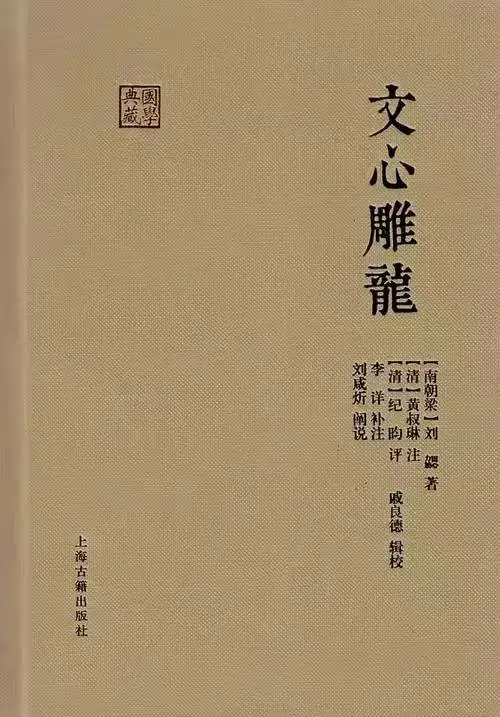The most systematic monograph on literary theory in ancient China
Overview
Chinese Name: 文心雕龙
English Name: The Literary Mind and the Carving of Dragons
Author: Liu Xie 刘勰
Originally Published: AD 501~502 (Southern Dynasty 南朝)
Genre: Literature, Monographs
Brief Introduction of The Literary Mind and the Carving of Dragons
The Literary Mind and the Carving of Dragons 文心雕龙 is the most systematic monograph on literary theory in the Southern Dynasty of China. It was written by literary theorist Liu Xie and was written between 501-502 (The Southern Dynasty). It is the first monograph on literary theory with strict system in the history of Chinese literary theory criticism. The Literary Mind and the Carving of Dragons was named after The Qin 琴 written by Huan Yuan 环渊.
The book, consisting of 50 chapters in 10 volumes, is based on Confucius‘ aesthetic thoughts 孔子的美学思想 and also draws on Taoism 道家, which holds that Taoism is the source of literature, that sages are models for scholars to learn, and that the “Classics 经书” are models for writing. This paper comprehensively summarizes the aesthetic achievements before the Qi and Liang dynasties 齐国和梁国, explores and discusses the aesthetic essence of language and literature and the aesthetic rules of creation and appreciation.
The Literary Mind and the Carving of Dragons also systematically discusses the relationship between the form and content of literature, inheritance and innovation. In the process of exploring and studying the conception of literary creation, it emphasizes the basic feature of the concrete image of artistic thinking activities, and preliminarily puts forward the problem of image thinking in artistic creation. It has a more conscious understanding of the artistic essence and characteristics of literature, which is the first to study literary image thinking.
The first five chapters are the outline of the book. Everything should be based on the heart, the ancient sages as the standard of examination, the Five Classics 五经 as the refuge.

From “Ming Shi 明诗” to “Shu Ji 书记” 20 pieces, centering on “preface pen of thesis”, this paper studies and evaluates various literary sources, writers and works one by one.
From “Shen Si 神思” to “Cheng Qi程器”, the 24 pieces focus on the creation theory and criticism, focusing on the problems and criticism appreciation in all aspects of the creation process. This is the main essence of the book.

The last part describes the author’s motivation, attitude and principles in writing this book.
Author of The Literary Mind and the Carving of Dragons
Liu Xie (c. 465 ~?) , is a native of Rizhao 日照市, Shandong Province 山东省. He was a minister in the Liang Period of the Southern Dynasty, a literary theorist and literary critic. When he was young, he was diligent and studious. He studied Confucian and Buddhist 佛家 theories and wrote the Literary Mind and the Carving of Dragons. The Literary Mind and the Carving of Dragons, an introduction to ancient and modern styles and practices, is one of the three great works of literary and historical criticism and has established its position in the history of Chinese literary criticism. At that time, he put forward many excellent rhetorical theories.
Liu Xie was an official in official circles and later became a monk. He lived in Dinglin Temple 定林寺 in Zhongshan 钟山 for about 20 years, where he devoted himself to study and research with the help of Dinglin Temple’s rich collection of books, and finally completed the great work of literary theory, the Literary Mind and the Carving of Dragons, which marked his brilliant achievement. Dinglin Temple in Zhongshan is also famous in history for Liu Xie’s academic achievements. Nowadays, the lection in Dinglin Temple was compiled and revised by Liu Xie.

Excerpts From The Literary Mind and the Carving of Dragons
夫情动而言形,理发而文见。
EMOTIONAL ACTIVATION IS EXPRESSED IN WORDS.THE PLAY OF REASON WILL BE EXPRESSED IN WORDS.
善于苦中作乐,连笑容都苦涩。
GOOD AT LAUGHING IN SUFFERING,EVEN IF THE SMILE IS BITTER.
心生而言立,言立而文明,自然之道也。
PEOPLE HAVE THOUGHTS AND FEELINGS,RESULTING IN LANGUAGE,WITH LANGUAGE,THERE WILL BE ARTICLES,WHICH IS A NATURAL TRUTH.
Evaluation of The Literary Mind and the Carving of Dragons
A systematic, comprehensive and in-depth discussion of literature, the Literary Mind and the Carving of Dragons is actually the only great work.
Fan Wenlan 范文澜
The literary theory of the Literary Mind and the Carving is based on Buddhism.
Rao Zongyi 饶宗颐








